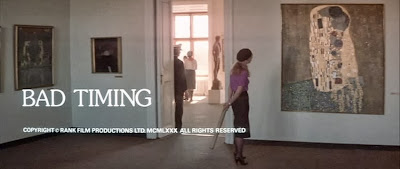 |
 |
| On the Czechoslavakian-Austrian border: Art Garfunkel and Teresa Russell in Bad Timing, 1980 |
Even beyond the way it looks, Bad Timing has some lovely gestures that make it completely a film
of its time. For example, the use of the border between Czechoslavakia and
Austria as Milena crosses for never fully explained reasons, is very much of
its time. Shot in 1979, the film assumes all of the chill of the border crossing
accompanied by the strains of Pachabel’s Canon that pervaded divided Europe
during the Cold War. And then when the film cuts to an austere Vienna, Milena
infuses verve and colour to an otherwise stiff, colourless world. The most
daring Vienna can offer is the seduction of the Gustav Klimt paintings,
surrounded by which we first see Milena and Lindon sharing their wisdom on sex
and love as they move through the Secessionist museum.
It’s not a perfect film by any means. The Harvey Keitel
character of the Austrian investigator of the “crime”, Milena’s mysterious
death, is tentatively placed as a mirror to Garfunkel’s Lindon, but the
mirroring isn’t developed. As Linden, the professor of psychoanalysis (an
appropriate profession for a film set in Vienna) becomes more and more
disturbed, in what is a textbook obsession for Milena, the vivacious woman he
can never fully own and dominate, Keitel’s character walks around looking very
handsome, but not doing an awful lot. How he reaches his genius insights that
prove Lindon’s rape and ultimate guilt in causing the death, is assumed, never
explained by the film. The only insight into Keitel’s character is so
unexplained that it seems irrelevant to the narrative when he comes home one
night and we see the photos of his wife on he dresser.
Similarly, why Milena has left her husband in Hungary is
never made clear – his role seems to be simply to tantalize Alex and to ensure
he has reason to distrust her, to confirm his reasons for obsession.
The narrative of Bad
Timing does not collapse in the same way that Performance ‘s does, both at the level of the gender collapsing and
the narrative’s imitation of that collapse. However, in Bad Timing the narrative has a very meandering, lazy forward
motion. While we never know where it is going, its unhurried wanderings are
forgive because the look of the film is so enticing, as is the conviction with
which a masterful depiction of sexual obsession that is only just on the other
side of the line that separates us from Alex Lindon. Bad Timing, with its radical storytelling techniques and its images
of sexuality at its most violent and irrevocable still puts a chill in the air.
Especially when the other films on offer here in Paris are the likes of Wolverine, Star Trek, and Spiderman.


No comments:
Post a Comment